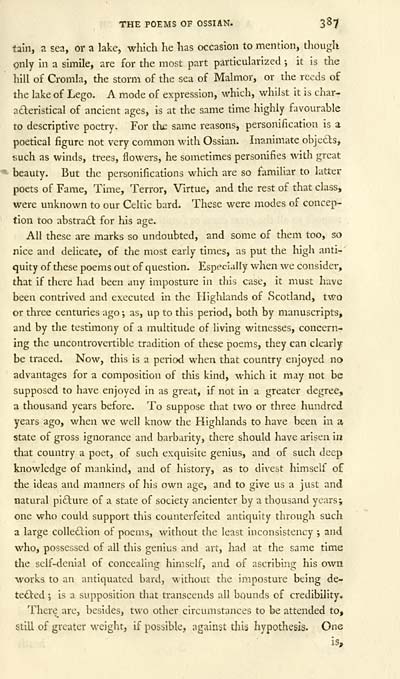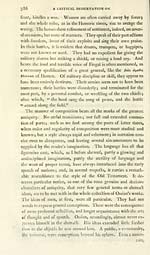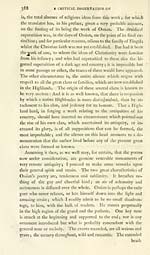Download files
Complete book:
Individual page:
Thumbnail gallery: Grid view | List view

THE POEMS OF OSSIAN. 387
tain, a sea, or a lake, which he has occasion to mention, though
Qnly in a simile, are for the most part particularized j it is the
hill of Cromla, the storm of the sea of Malmor, or the reeds of
the lake of Lego. A mode of expression, which, whilst it is char-
aderistical of ancient ages, is at the same time highly favourable
to descriptive poetry. For the same reasons, personification is a
poetical figure not very common with Ossian. Inanimate objects,
such as winds, trees, flowers, he sometimes personifies with great
beauty. But the personifications which are so familiar to latter
poets of Fame, Time, Terror, Virtue, and the rest of that class,
were unknown to our Celtic bard. These were modes of concep-
tion too abstract for his age.
All these are marks so undoubted, and some of them too, so
nice and delicate, of the most early times, as put the high anti-
quity of these poems out of question. Especially when we consider,
that if there had been any imposture in this case, it must have
been contrived and executed in the Highlands of Scotland, two
or three centuries ago -, as, up to this period, both by manuscripts,
and by the testimony of a multitude of living witnesses, concern-
ing the uncontrovertible tradition of these poems, they can clearly
be traced. Now, tliis is a period when that country enjoyed no
advantages for a composition of this kind, which it may not be
supposed to have enjoyed in as great, if not in a greater degree,
a thousand years before. To suppose that two or three hundred
years ago, when we well know the Highlands to have been in a
state of gross ignorance and barbarity, there should have arisen in
that country a poet, of such exquisite genius, and of such deep
knowledge of mankind, and of history, as to divest himself of
the ideas and manners of his own age, and to give us a just and
natural pifture of a state of society ancienter by a thousand years;
one who could support this counterfeited antiquity through such
a large collection of poems, without the least inconsistency ; and
who, possessed of all this genius and art, had at the same time
tlie self-denial of concealing himself, and of ascribing his own
works to an antiquated bard, without the imposture being de-
tected j is a supposition that transcends all bounds of credibility.
There are, besides, two other circumstances to be attended to,
still of greater weight, if possible, against this hypothesis. One
is.
tain, a sea, or a lake, which he has occasion to mention, though
Qnly in a simile, are for the most part particularized j it is the
hill of Cromla, the storm of the sea of Malmor, or the reeds of
the lake of Lego. A mode of expression, which, whilst it is char-
aderistical of ancient ages, is at the same time highly favourable
to descriptive poetry. For the same reasons, personification is a
poetical figure not very common with Ossian. Inanimate objects,
such as winds, trees, flowers, he sometimes personifies with great
beauty. But the personifications which are so familiar to latter
poets of Fame, Time, Terror, Virtue, and the rest of that class,
were unknown to our Celtic bard. These were modes of concep-
tion too abstract for his age.
All these are marks so undoubted, and some of them too, so
nice and delicate, of the most early times, as put the high anti-
quity of these poems out of question. Especially when we consider,
that if there had been any imposture in this case, it must have
been contrived and executed in the Highlands of Scotland, two
or three centuries ago -, as, up to this period, both by manuscripts,
and by the testimony of a multitude of living witnesses, concern-
ing the uncontrovertible tradition of these poems, they can clearly
be traced. Now, tliis is a period when that country enjoyed no
advantages for a composition of this kind, which it may not be
supposed to have enjoyed in as great, if not in a greater degree,
a thousand years before. To suppose that two or three hundred
years ago, when we well know the Highlands to have been in a
state of gross ignorance and barbarity, there should have arisen in
that country a poet, of such exquisite genius, and of such deep
knowledge of mankind, and of history, as to divest himself of
the ideas and manners of his own age, and to give us a just and
natural pifture of a state of society ancienter by a thousand years;
one who could support this counterfeited antiquity through such
a large collection of poems, without the least inconsistency ; and
who, possessed of all this genius and art, had at the same time
tlie self-denial of concealing himself, and of ascribing his own
works to an antiquated bard, without the imposture being de-
tected j is a supposition that transcends all bounds of credibility.
There are, besides, two other circumstances to be attended to,
still of greater weight, if possible, against this hypothesis. One
is.
Set display mode to: Large image | Transcription
Images and transcriptions on this page, including medium image downloads, may be used under the Creative Commons Attribution 4.0 International Licence unless otherwise stated. ![]()
| Early Gaelic Book Collections > Ossian Collection > Poems of Ossian, the son of Fingal > (399) |
|---|
| Permanent URL | https://digital.nls.uk/77928141 |
|---|
| Description | Selected books from the Ossian Collection of 327 volumes, originally assembled by J. Norman Methven of Perth. Different editions and translations of James MacPherson's epic poem 'Ossian', some with a map of the 'Kingdom of Connor'. Also secondary material relating to Ossianic poetry and the Ossian controversy. |
|---|
| Description | Selected items from five 'Special and Named Printed Collections'. Includes books in Gaelic and other Celtic languages, works about the Gaels, their languages, literature, culture and history. |
|---|

